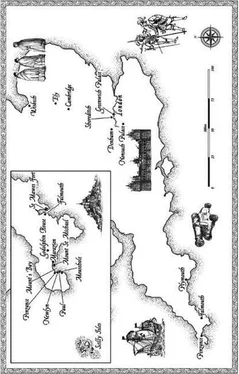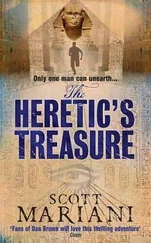Rory Clements - The Heretics
Здесь есть возможность читать онлайн «Rory Clements - The Heretics» весь текст электронной книги совершенно бесплатно (целиком полную версию без сокращений). В некоторых случаях можно слушать аудио, скачать через торрент в формате fb2 и присутствует краткое содержание. Год выпуска: 2013, Издательство: John Murray, Жанр: Исторический детектив, на английском языке. Описание произведения, (предисловие) а так же отзывы посетителей доступны на портале библиотеки ЛибКат.
- Название:The Heretics
- Автор:
- Издательство:John Murray
- Жанр:
- Год:2013
- ISBN:нет данных
- Рейтинг книги:3 / 5. Голосов: 1
-
Избранное:Добавить в избранное
- Отзывы:
-
Ваша оценка:
- 60
- 1
- 2
- 3
- 4
- 5
The Heretics: краткое содержание, описание и аннотация
Предлагаем к чтению аннотацию, описание, краткое содержание или предисловие (зависит от того, что написал сам автор книги «The Heretics»). Если вы не нашли необходимую информацию о книге — напишите в комментариях, мы постараемся отыскать её.
The Heretics — читать онлайн бесплатно полную книгу (весь текст) целиком
Ниже представлен текст книги, разбитый по страницам. Система сохранения места последней прочитанной страницы, позволяет с удобством читать онлайн бесплатно книгу «The Heretics», без необходимости каждый раз заново искать на чём Вы остановились. Поставьте закладку, и сможете в любой момент перейти на страницу, на которой закончили чтение.
Интервал:
Закладка:
‘No, nothing happened. Not that I know of, anyway.’
‘She disappeared on a day very like today, Mr Shakespeare,’ Lady Trevail said. ‘We were all here as usual, talking of poetry and music. Of course most of the talk in those days was of the Babington horrors and the exorcisms. Also the likely fate of Mary Stuart and the possibility of invasion. On any other day, that would have been our bill of fare, but we had too much sensibility to discuss treason and horror in front of the girl. The last thing she wished to hear was talk of executions and conspiracy.’
‘How did she seem?’
‘Agitated,’ Lady Susan said. ‘Greatly agitated. She asked to be excused from our presence, hurried from this very room and was gone. That was the last anyone saw of her. No one witnessed her leaving the house. She did not even go to her room to collect her few belongings.’
‘None of the servants saw her leave?’
‘No.’
‘And what belongings did she leave behind?’
‘We found her purse with two pennies and a farthing in it, a comb, and the night garments I had given her. That is all. She took nothing but the clothes she wore.’
‘Can you describe her to me? Was she tall? Fair? Plump?’
‘Mousy red, I would say,’ Lady Susan said. ‘Not especially pretty, but fair enough. She was thin, but I don’t think she had eaten properly for weeks on end. She did not like to meet your eye.’
‘She might look very different now,’ Shakespeare said, musing aloud.
‘Indeed she might, if she has recovered from her madness.’
The woman on the floor said something too. Her voice was low and rough with smoke, and he could not make out the words. He leant forward. ‘Miss Eastley?’ he asked, hoping she would repeat her observation, but she did not.
He would have asked them more, might well have enjoyed passing the day with them, but he was learning very little and there was too much to be done elsewhere. He bowed. ‘My ladies, I will take up no more of your time, for the present.’
Francis Mills accompanied Captain Roberts in the barge downstream to Gravesend. He asked little and heard almost nothing; his head was filled with crashing waves of noise, like an incoming tide on a pebble beach.
‘Who was this dead mariner, Captain?’ Mills asked, like a child repeating its numbers by rote.
‘His name was Franklin Smith. He was an ordinary seaman. The ship’s master, who you will meet on board The Ruth , says Smith approached him when we were in Bordeaux. He was looking to work his passage home. From what the master tells me, he was no more than a bilge monkey, useful for loading of goods or hauling of cables but nothing more. Lower than the rats in the scuppers.’
‘And what is your cargo?’
‘From Bordeaux? Wine, of course, Mr Mills. Well, here we are, sir.’ The barge pulled into the quayside near the smoking chimneys and massed masts of Gravesend. Captain Roberts lifted his chin in the direction of a large carrack, at anchor with its sails furled, a little way from shore. ‘And there she is, The Ruth . The sooner this is all over, the better. The men are becoming restive, penned in like livestock, and we must discharge our cargo. The investors will not allow another day’s delay. Mr Mills? Mr Mills. .’
Francis Mills did not move at first, but then rose from his bench seat and disembarked with Roberts, who hailed a ship’s boat. Through the surging roar of his mind, it occurred to Mills that he really should have heeded Sir Robert Cecil’s instructions and brought someone with him to help interview the crew of this vessel. Alone, it was a daunting prospect. No, it was impossible. He could not do it this day. He was not thinking aright. Not thinking right at all. He wasn’t really here. He was in a bedroom, dank with lust and sweat and skin. There was a blade in his hand and he was wondering how it would slip through flesh.
Suddenly he was caught short of breath. He closed his eyes and grasped the captain’s arm.
‘Mr Mills, you do not look well, sir.’
He couldn’t move. He felt his knees would give way and that he would fall. The rushing in his head was a storm. His breathing was fast and shallow. A pain assailed his heart. He bent forward and clutched at his chest. He was going to die; he knew he was going to die.
‘Mr Mills. .’
Mills turned and stumbled back towards the barge, still holding his chest, fearing his heart would burst from his body. He had to get home; he had to get back to London.
Chapter 7
‘He looks a little better, Jane,’ Boltfoot said, staring at his two-year-old son who lay in the small wooden cot he had made for the boy. ‘Do you not think he looks more lively?’
‘I do so think, Boltfoot. I pray it is so, leastwise.’
‘And is he taking more food?’
Jane nodded. ‘A little more.’
‘Did I not tell you it would be so? We have no need for physicians and apothecaries with their unholy magic and conjuring of spirits.’
He might say such things, but Jane knew her husband worried even more than she did about the boy.
‘Boltfoot Cooper, I do sometimes think the years you spent at sea turned your brain to pease pudding.’
Boltfoot smiled at his wife then leant into the cot and kissed the boy. He patted Jane on the small of her back and was about to take his leave of her and go in search of Mr Shakespeare, when she stayed him.
‘Why is it that we never celebrate your birthday, Boltfoot? What day were you born?’
‘You say my brain is turned to pease pudding, Jane. What of yours, to be asking such daft questions? I don’t even know the year I was born, let alone the day.’
Jane let him go. How was she to discover the information Dr Forman needed to cast a chart if Boltfoot did not know it himself?
They were all living in cramped quarters, in the part of the house that had survived the fire of last year. There were still smoke-black marks on timbers, but the structure, close to the Thames at Dowgate, was sound enough. The part of the building that had been utterly destroyed had been cleared away and was already being rebuilt, from the ground up. This time the house would be smaller, with a larger garden and improved stabling.
Shakespeare looked up from his table, where he had been scribbling a note to Cecil, telling him of the meeting with the Countess of Kent and her circle. He would need to speak with Lady Susan again, and preferably without the distractions of her companions. He wished to learn more about her ward, the sullen Beatrice Eastley, too. Something seemed not quite right there. He would also welcome another meeting with Lady Trevail; but that was another matter.
‘You summoned me, master?’
‘Ah yes, Boltfoot. I take it there is still no word of Mr Garrick Loake?’
‘No, master.’
Shakespeare cursed. The man had disappeared like smoke in air. Well, Loake would have to wait. He would add word of this in the letter to Cecil, and urge him to engage Anthony Friday to find the would-be informant. Friday was unreliable, but no one knew the world of players and playhouses better than he did.
Shakespeare turned back to Boltfoot. ‘We are riding for Buckinghamshire. Have horses saddled.’
‘Yes, master.’
‘And Boltfoot. .’
Boltfoot stopped. It seemed to Shakespeare that he had aged five years in the past few months since the fire. This latest sickness afflicting their child had only made matters worse.
‘How does little John fare?’
‘Better, master. Better.’
‘Good. Well, if he requires remedies or if you wish him to be seen by a physician, I will bear the cost.’
‘Thank you, Mr Shakespeare. I am sure we won’t need that.’
‘As you will, but the offer is there. And send Andrew to me, if you would.’
Читать дальшеИнтервал:
Закладка:
Похожие книги на «The Heretics»
Представляем Вашему вниманию похожие книги на «The Heretics» списком для выбора. Мы отобрали схожую по названию и смыслу литературу в надежде предоставить читателям больше вариантов отыскать новые, интересные, ещё непрочитанные произведения.
Обсуждение, отзывы о книге «The Heretics» и просто собственные мнения читателей. Оставьте ваши комментарии, напишите, что Вы думаете о произведении, его смысле или главных героях. Укажите что конкретно понравилось, а что нет, и почему Вы так считаете.












